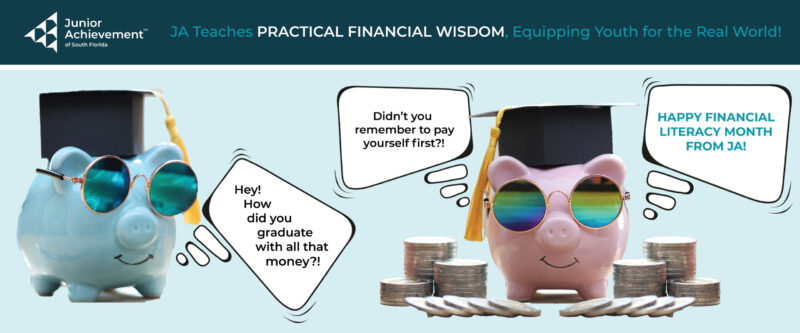In the wake of economic instability, intensified by factors like inflation, global unrest, and market volatility, one glaring reality continues to remain: the critical importance of financial literacy. During challenging times, it becomes extremely apparent that empowering individuals with the knowledge and skills to make sound financial decisions is not just a benefit but a necessity for economic resilience.
April, designated as Financial Literacy Month, shines a light on the importance of financial education. It provides us with an opportunity to reflect on the state of financial education and to advocate for greater awareness and action around this issue.
Statistics highlight the urgency of addressing the financial literacy gap. According to a study by the National Financial Educators Council, 63% of Americans are unable to answer basic financial literacy questions correctly. Statistics also show 53% of Americans say they were never taught how to handle money growing up.
In 2022, Governor Ron DeSantis signed Senate bill 1054 requiring students who enter high school beginning in the 2023 – 24 school year to take a ½ credit financial literacy course to graduate. While this is undoubtedly a step in the right direction, it’s important to recognize that it’s not enough. Financial literacy should be a fundamental component of every student’s learning journey, starting at an early age and continuing through their academic career.
Meet Emily, a young woman who experienced the transformative power of financial literacy education in 8th grade. Emily participated in the Junior Achievement Finance Park program in 2009, the year the JA World Huizenga Center at the Lillian S. Wells Pavilion opened. Due to a unique partnership agreement between Junior Achievement of South Florida and Broward County Public Schools, every 8th grade student participates in a program that combines engaging classroom lessons with a fast-paced real-life simulation at JA World. The agreement also requires that every 5th grade student participate in the JA BizTown program.
The lessons Emily learned provided a foundation which proved to be invaluable as she entered adulthood. Unlike some of her friends who found themselves in difficult financial situations, Emily turned down high interest rate credit cards offered to her throughout her college years; she created a budget to help her to spend only what she could afford; and when she secured a part-time job, she “paid herself first”, a lesson about saving she remembers most.
Emily’s story is a powerful testament to the importance of financial literacy education and its ability to change lives. By equipping young people with the knowledge and skills to make informed, positive financial decisions, we can empower them to avoid financial adversity.
Partnerships between schools, individuals, government agencies, businesses, non-profits and financial institutions are essential to enhancing this education. As one of our three core pillars, Junior Achievement of South Florida embeds financial literacy in all of its programs, including our high school workforce training and education programs like Stock Market Challenge, Career Bound Workforce Training and Employment Program and Pre-Apprenticeships, so students understand how to manage, save and invest their earnings once they begin their careers. We partner with hundreds of individual and corporate volunteers and sponsors who get involved in making financial literacy education relevant and impactful.
I hear parents say everyday how they wish their children understood the basics of money management. As a parent myself, and as the CEO of one of the largest non-profit organizations dedicated to financial literacy, workforce education and entrepreneurship, I encourage parents to get involved in promoting, advocating and volunteering in financial literacy education.
I encourage Governor DeSantis, state legislators, and local officials to not only mandate that this education is included in education, but to provide funding for programs that teach these skills and prepare our youth.
I encourage businesses to provide opportunities for their employees to mentor students and support and sponsor programs that will help our youth manage their money so they can be responsible consumers of your products and services.
Together let’s make financial literacy education a priority and empower the next generation to thrive in the future!
Laurie Sallarulo, CEO of Junior Achievement of South Florida


